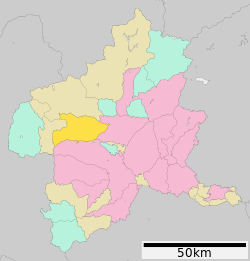Higashiagatsuma, Gunma
|
Higashiagatsuma 東吾妻町 |
|||
|---|---|---|---|
| Town | |||

Higashiagatsuma town office
|
|||
|
|||
 Location of Higashiagatsuma in Gunma Prefecture |
|||
| Coordinates: 36°34′17″N 138°49′32″E / 36.57139°N 138.82556°ECoordinates: 36°34′17″N 138°49′32″E / 36.57139°N 138.82556°E | |||
| Country | Japan | ||
| Region | Kantō | ||
| Prefecture | Gunma Prefecture | ||
| District | Agatsuma | ||
| Area | |||
| • Total | 253.91 km2 (98.04 sq mi) | ||
| Population (February 2015) | |||
| • Total | 14,426 | ||
| • Density | 56.8/km2 (147/sq mi) | ||
| Time zone | Japan Standard Time (UTC+9) | ||
| - Tree | Keyaki | ||
| - Flower | Narcissus (plant) | ||
| - Bird | Green pheasant | ||
| Phone number | 0279-68-2111 | ||
| Address | 594-3, Ōaza Haramachi, Higashiagatsuma-machi, Agatsuma-gun, Gunma-ken 377-0892 | ||
| Website | Official website | ||
Higashiagatsuma (東吾妻町 Higashiagatsuma-machi?) is a town located in Agatsuma District of central Gunma Prefecture in the northern Kantō region of Japan. As of February 2015, the town had an estimated population of 14,426 and a population density of 56.8 persons per km². Its total area was 253.91 km².
Located in the northwestern portion of Gunma Prefecture, Higashiagatsuma is surrounded by high peaks, including Mount Iwabitsu (802.6 meters).
During the Edo period, the area around Higashiagatsuma was part of the hatamoto-administered territory within Kōzuke Province.
With the creation of the municipalities system after the Meiji Restoration on April 1, 1889, the town of Hara and the villages of Ota, Iwasaki and Sananoue and Azuma were created within Agatsuma District of Gunma Prefecture. The first three villages merged into Hara in 1965, which was renamed Agatsuma Town in February 1956.
Higashiagatsuma was created on March 27, 2006 by the merger of the town of Agatsuma, and the village of Azuma, both from Agatsuma District.
The economy of Higashiagatsuma is heavily dependent on agriculture and seasonal tourism. Noted local crops include garlic and myoga production. Tourism from ski resorts and onsen hot springs also contribute to the local economy. Mount Ajara was a venue for the 2003 Asian Winter Games).
...
Wikipedia



